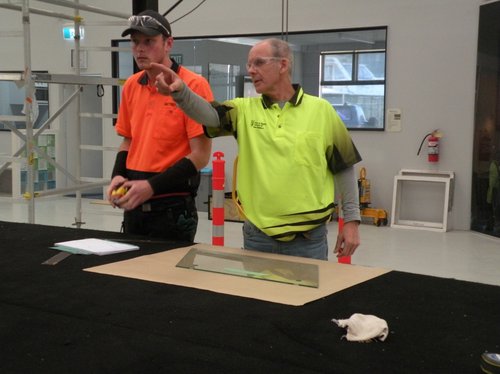Question time with Frank Coles GGINZ Tutor

We caught up with Frank Cole, one of the Tutors at the Glass and Glazing Institute of New Zealand (GGINZ) and asked him a few questions. This way, Block Course students have the opportunity to get to know who Frank is before attending this year's courses.
Frank, how long have you been teaching at GGINZ? What work history do you have in the glass and glazing sector?
I did my glazing apprenticeship in the early 80s in Palmerston North, then moved to Auckland, where I spent two years working as a sales coordinator in a glass processing plant. I had a couple of years overseas playing rugby, then when I returned home, I moved into a sales rep position and then into a management role.
I have been with GGINZ since 20005 and have lived in the Wellington area for the last 30 years. Over this time, I have seen many changes in the school. we have had our challenges but are focused on keeping up with the industry and keeping the school relevant. My focus as a tutor is to keep training in the classroom relevant to what apprentices are doing daily, focusing on what is suitable for the industry and how we can best service it.
What makes being a GGINZ tutor satisfying?
Seeing students progress through the years into qualified tradespeople is highly satisfying. In the beginning, students can be tentative and anxious, and seeing them develop into competent and confident tradespersons at the end of their time is an enriching process to be a part of. We often have students say that if they are ever in Wellington, they will drop in, and they do; it's great; they pop in so we can catch up on what they are up to and see what we are doing also.
The Glass and Glazing Industry constantly develops with technology and new standards. How do tutors and GGINZ stay abreast of the change and technology?
We are constantly adapting to industry changes. Regarding standards, we incorporate H1 requirements into the class curriculum, discussing topics such as thermally broken frames with low E glass using Argon gas.
GGINZ does its best to provide quality tools and machinery to its students; we have always had a “Vacuum Lifter” and recently purchased a “Smart Lifter”. This is an excellent bit of machinery, which some smaller glazing companies don’t get the opportunity to use. It’s great because we can extend the scope of machinery some students have had access to. We also have technical machinery such as the pro liner, used for complex templating and measuring. This is an expensive bit of machinery and allows students to try using it in a controlled environment.
Why should people look to the Glass and Glazing Sector as a career?
A significant benefit to the sector is the wide variety of work; working as a residential glazier, you can go to four or five different jobs in a day, and they could all be tasks requiring different skills and knowledge, so you are always doing something different.
In the long term, the Glass and Glazing Industry offers many career development opportunities; you can go into sales, management, design, operations, or tutoring. As the Glass and Glazing technology develops, so do further career opportunities. The industry has many different aspects, giving excellent career pathways.
Any advice or preparation tips for trainees about to attend block course?
The biggest thing is a good attitude; attitude comes down to turning up to class or work on time, being vigilant with your learning, being prepared, ensuring you have all your PPE, ensuring you have the tools for the class, and having a way of keeping notes.
If you have the right attitude, you can learn anything and do anything.

